|
|
 |
Fiche d'espèce de Copépode |
|
|
Calanoida ( Ordre ) |
|
|
|
Clausocalanoidea ( Superfamille ) |
|
|
|
Aetideidae ( Famille ) |
|
|
|
Chiridiella ( Genre ) |
|
|
| |
Chiridiella abyssalis Brodsky, 1950 (F,M) | |
| | | | | | | Syn.: | Chiridiella reducta Brodsky, 1950 (p.195, figs.M, non F); Vidal, 1971 a (p.22, figs.M, no F) | | | | Ref.: | | | Brodsky, 1950 (1967) (p.193, Descr.F, figs.F); ? Johnson, 1963 (p.92, 96, fig.F); Markhaseva, 1983 (p.120, Descr.F, figs.F, Rem.); 1996 (p.88, figs.F,M); Harding, 1966 (p.24, 94, figs.F) | 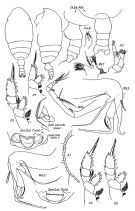 issued from : E.L. Markhaseva in Proc. Zool. Inst. RAN, St. Petersburg, 1996, 268. [p.89, Fig.64]. Female (from Markhaseva, 1983, with qdditions after specimens from the central part of Arctic Basin). P.md: mandibular palp.
|
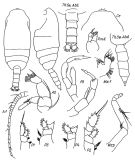 issued from : E.L. Markhaseva in Proc. Zool. Inst. RAN, St. Petersburg, 1996, 268. [p.90, Fig.65]. Male. Ce: forehead (dorsal); P.md: mandibular palp.
|
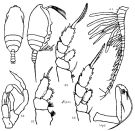 Issued from : K.A. Brodskii in Calanoida of the Far Eastern Seas and Polar Basin of the USSR. Opred. Fauna SSSR, 1950, 35 (Israel Program for Scientific Translations, Jerusalem, 1967) [p.195, Fig.111]. As Chiridiella reducta. Male (from central part Arctic): habitus (dorsal and lateral right side); A1; Mp2, Mxp; S1, P1; S2, P2; S4, P4; S5, P5.
|
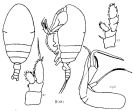 Issued from : K.A. Brodskii in Calanoida of the Far Eastern Seas and Polar Basin of the USSR. Opred. Fauna SSSR, 1950, 35 (Israel Program for Scientific Translations, Jerusalem, 1967) [p.193, Fig.108]. Female (from NW Pacif.): habitus (dorsal and lateral left side); Mp2, Mx2; S1, P1; S2, P2.
|
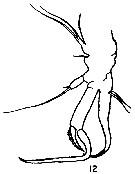 issued from : M.W. Johnson in Limnol. and Oceanogr., 1963, 8 (1). [p.95, Fig.3, (12)]. With doubt. Female (from Arctic basin)): 12, Mx2. Nota: Mx2 and the segmentation and spinulation of the swimming legs is most nearly that of C. abyssalis Brodsky which has been reported only from the North Pacific. The P1 have 1-segmented rami; P2 have 3-segmented exopods (division between 1 and 2 incomplete) and 1-segmented endopods. There is a normal external spine on the 1st exopod segment of each leg. P3 and P4 are similar to P2 but show slight marginal indentations on the endopod suggesting segmentation, and P4 are somewhat elongated. The species might almost as readily be considered described by Brodsky from the Polar Basin, but for the fact that the species is described as having no external spine on the 1st exopodal segments of the P2 and P3. This might be a variable character. One specimen was found in which this spine on P2 was about 1/4 normal size on one side and on the opposite leg it was either absent or lost. P3 had normal spines on all segments, but the terminal segment of P4 had only 2 external spines on one leg whereas the opposite leg had the normal 3.
|
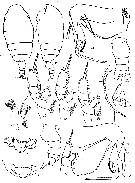 issued from : E.L. Markhaseva in Zool. Zh., 1983, 62 (1). [p.121, Fig.1]. Female (from Arctic): 1-2, habitus (dorsal and lateral, respectively); 3, urosome (dorsal); 4, idem (left lateral); 5-6, genital field; 7, genital field (latral view); 8, A1; 9, Md (mandibular palp); 10, Mx1; 11-12, Mx2; 13, P1; 14, P2; 15, P3; 16, P4. 6, 7, 12, from Arctic; other figures from Pacific Ocean.
|
 Chiridiella abyssalis Chiridiella abyssalis female: 1 - Mx2 with 5 endites. 2 - Mx2 strongly modified in comparison with typical; first-fifth endites of varying size; Setation is not typical, some number of setae on third-fifth endites transformed into pincers-like spines. 3 - Setae of fourth endite of Mx2 arranged like pincers. 4 - Endopodal segment 2 of Md with 3 setae. Mx1 with exopod, exopod with 4 setae. 5 - Protopodite of Mxp with 2 setae in distal group. 6 - P3-P4 with 1-segmented , with slight traces of separation between endopodal segments 1 and 2.
|
 Chiridiella abyssalis Chiridiella abyssalis female ; 1 - Penultimate lobe of Mx2 with 1 long and 1 short spine arranged as pincers. 2 - Mx2 with 3 modified lobes. 3 - Exopod segment 1 of P2 and P3 with outer edge spine.
| | | | | Ref. compl.: | | | M.W. Johnson, 1963 (p.89, Table 1, 2); Harding, 1966 (p.17, 71); Dunbar & Harding, 1968 (p.319); Hattori, 1991 (tab.1, Appendix); Richter, 1994 (tab.4.1a); Auel, 1999 (tab.2); Kosobokova & Hirche, 2000 (p.2029, tab.2); Park & Ferrari, 2009 (p.143, fig.2, biogeography); Kosobokova & Hopcroft, 2010 (p.96, Table 1, fig.7); Homma & Yamaguchi, 2010 (p.965, Table 2); Homma & al., 2011 (p.29, Table 2, 3, abundance, feeding pattern: suspension feeders); Kosobokova & al., 2011 (p.29, Table 2, Rem.: Arctic Basins) | | | | NZ: | 3 | | |
|
Carte de distribution de Chiridiella abyssalis par zones géographiques
|
| | | 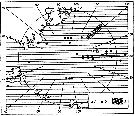 issued from : E.L. Markhaseva in Zool. Zh., 1983, 62 (1). [p.122, Fig.2]. issued from : E.L. Markhaseva in Zool. Zh., 1983, 62 (1). [p.122, Fig.2].
Occurrence of Chiridiella abyssalis in the Arctic Ocean.
1 from Johnson, 1953; 3 from Dunbar & Harding, 1968. |
| | | | Loc: | | | Japan (off Sanriku), Kuril-Kamchatka, Aleoutian Trench, Bering Sea , S Aleutian Basin, S Aleutian Is., Arct. (all polar Basins, Arct. (Fletcher's Ice Is., Canada Basin), Greenland Sea | | | | N: | 17 | | | | Lg.: | | | (22) F: 2,9; M: 2,7; (222) F: 2,9-2,45; M: 3-2,7; ? (223) F: 2,1-2,3; {F: 2,45-2,90; M: 2,70-3,00} | | | | Rem.: | abyssopélagique.
Voir aussi les remarques en anglais | | | Dernière mise à jour : 26/07/2018 | |
|
|
 Toute utilisation de ce site pour une publication sera mentionnée avec la référence suivante : Toute utilisation de ce site pour une publication sera mentionnée avec la référence suivante :
Razouls C., Desreumaux N., Kouwenberg J. et de Bovée F., 2005-2026. - Biodiversité des Copépodes planctoniques marins (morphologie, répartition géographique et données biologiques). Sorbonne Université, CNRS. Disponible sur http://copepodes.obs-banyuls.fr [Accédé le 30 janvier 2026] © copyright 2005-2026 Sorbonne Université, CNRS
|
|
 |
 |










